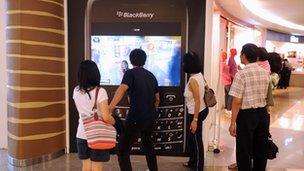Blackberry maker's Asia boss remains optimistic about Indonesia
- Published
Gandaria Mall is a glitzy, swanky and monstrous shopping mall in South Jakarta - a visual testament to the consumer culture prevalent in Indonesia today.
This giant shopping complex is where Research In Motion (RIM), the makers of Blackberry phones, decided to put their largest showroom in Asia - a sign, the firm says, of its commitment to a key market.
Indonesia is often called Blackberry nation - a reference to how many people you'll find in this country tapping away on their "BBs", as the phones are called here.
The Blackberry showroom in Gandaria Mall is not as big as you would imagine, given that the company says it is the largest in Asia. But young men and women are still to be found inside, testing the latest smart phones and tablets.
Titi Natalia is one of the quintessential Blackberry users in Indonesia. She is in the store to buy yet another smartphone - her third so far - simply because she feels she needs to stay connected at all times.
"All of my friends use a Blackberry and the Blackberry messenger Chat service, so I have ended up following the trend - like everyone else!" she says as she looks through the latest models on display.
Sour relations

Crowds of people stand in queues for a discounted Blackberry smart phone promotion last year
But its popularity can sometimes have dangerous consequences.
Last year, a stampede erupted at a Jakarta mall over a promotional sale of Blackberry's latest phones.
It soured already testy relations between the Indonesian government and RIM.
However, Gregory Wade, RIM's boss in Asia, contested the presumption that the relationship between his firm and the Indonesian government had suffered because of the incident last year.
"I wouldn't characterise the environment as a stampede," the Singapore-based chief executive said during an interview while he was visiting Jakarta.
"We commented publicly on our concern over the situation and we demonstrated an outward reflection and meaningful reflection to those who were involved in that event and who suffered through that event.
"We also made some very public comments that not only did we run our own investigation, we also ensured that there would never be a reoccurrence of what happened."
Mr Wade says Indonesia is still an ideal market for the company.
"I'm so happy about this [showroom] - there's no place better to be for Blackberry than Indonesia," he added.
But there is an underlying suspicion amongst Indonesian officials that Blackberry's executives are not too bothered about what goes on in Indonesia, as long as they keep selling their phones here.
They have also spoken publicly about their desire for RIM to invest more heavily in one of their biggest markets.
Potential hurdle
Most recently, the tussle has been over data centres. Indonesia has expressed its displeasure at RIM's decision to set one up in Singapore, instead of Indonesia.
Gatot Dewa Subroto, the spokesman for Indonesia's communications ministry, told the BBC that under a law that is likely to go into effect some time this year, it will be mandatory for RIM and other firms in similar industries to set up data centres in Indonesia.
"We don't want to ban or sanction RIM," he said in his government offices in Jakarta.
"But we have to remind them that in 2012 it will be compulsory, they have to build a data centre in Indonesia.
"The consequence? It's logical - the option is just to obey the law or break the law, and if they break the law, there will be a consequence to RIM."
The law has yet to be signed by Indonesia's President Susilo Bambang Yudhoyono. Until it is, it cannot be implemented.
But already many industry watchers have said this could be a potentially huge hurdle for foreign smartphone makers such as RIM to overcome.
RIM, for its part, says it is investing in Indonesia, by setting up more than 4,000 points of presence in the country, which will employ thousands of young Indonesians and help raise salaries and standards of living in their communities.
Attractive market
There is no doubt that Indonesia, with its fast growing economy and population of 240 million, is an attractive market for smartphone makers.
The top three smartphone brands in Indonesia are currently RIM's Blackberry, Samsung's smartphone and Apple's iPhone, although Android phones are also expected to catch up fast because of their relatively cheaper price.

Mobile handset demand is driven by Indonesia's burgeoning middle class
Analysts say the main driver behind the use of these gadgets in Indonesia is how they help people get online.
It is thought there are about 39 million internet users in Indonesia - and 22% of those people access the internet through their smartphones - according to research by Frost and Sullivan, a telecommunications consultancy, because landline connections are so slow.
But getting connected is not the only thing that makes smartphones so successful here.
Iwan Rachmat, a senior consultant with technology research group Frost and Sullivan, says it has a lot to do with Indonesian culture, particularly where social status is concerned.
"If my friend has a Blackberry and they have a community of Blackberry people chatting, then I have to have one too, otherwise I cannot contact my friend," he says.
"It is also a fashion statement - I have this iPhone, so I belong to this community. [Among] the youth community, if my friend has this cool thing, then I have to have one too."
With their desire for the "latest cool thing", young urban Indonesians are increasingly becoming the consumers of choice for foreign firms - and phone makers have found that the upwardly mobile middle class is keen to get its hands on new gadgets.
But Indonesia wants foreign smartphone firms to play by its rules, to ensure that some of that wealth stays in this country too.
- Published6 December 2011